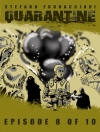INFPs are guided by strong principles; you will find them frequently lost in their imagination and daydreams. In this book you will find seven short stories specially selected to please the tastes of the INFP. These are stories by renowned authors that will surely bring reflections, insights and fun to people with this kind of personality.
This book contains:
Letter to Menoeceus by Epicurus.
The Skylight Room by O. Henry.
The Model Millionaire by Oscar Wilde.
The Little Girl by Katherine Mansfield.
Kew Gardens by Virginia Woolf.
Two Friends by Guy de Maupassant.
The Rocking-Horse Winner by D. H. Lawrence.
For more books that will suit you, be sure to check out our Two Classic Novels your Myers-Briggs Type Will Love collection!
***
Cover Image: William Shakespeare (1564 – 1616), the greatest writer in the English language and INFP.
Over de auteur
Epicurus was an ancient Greek philosopher and sage who founded a highly influential school of philosophy now called Epicureanism. He was born on the Greek island of Samos to Athenian parents. Influenced by Democritus, Aristotle, Pyrrho, and possibly the Cynics, he turned against the Platonism of his day and established his own school, known as ’the Garden’, in Athens. Epicurus and his followers were known for eating simple meals and discussing a wide range of philosophical subjects, and he openly allowed women to join the school as a matter of policy.
William Sydney Porter, better known by his pen name O. Henry, was an American short story writer. O. Henry’s stories frequently have surprise endings. In his day he was called the American answer to Guy de Maupassant. While both authors wrote plot twist endings, O. Henry’s stories were considerably more playful, and are also known for their witty narration. Most of O. Henry’s stories are set in his own time, the early 20th century. Many take place in New York City and deal for the most part with ordinary people: policemen, waitresses, etc.
Oscar Fingal O’Flahertie Wills Wilde was an Irish poet and playwright. After writing in different forms throughout the 1880s, he became one of London’s most popular playwrights in the early 1890s. He is best remembered for his epigrams and plays, his novel The Picture of Dorian Gray, and the circumstances of his criminal conviction for ‘gross indecency’, imprisonment, and early death at age 46.
Kathleen Mansfield Murry was a prominent New Zealand modernist short story writer and poet who was born and brought up in colonial New Zealand and wrote under the pen name of Katherine Mansfield. At the age of 19, she left New Zealand and settled in England, where she became a friend of writers such as D. H. Lawrence and Virginia Woolf. Mansfield was diagnosed with extrapulmonary tuberculosis in 1917; the disease claimed her life at the age of 34.
Adeline Virginia Woolf was an English writer, considered one of the most important modernist 20th-century authors and also a pioneer in the use of stream of consciousness as a narrative device. Woolf became one of the central subjects of the 1970s movement of feminist criticism and her works have since garnered much attention and widespread commentary for ‘inspiring feminism.’ Her works have been translated into more than 50 languages.
Henri René Albert Guy de Maupassant was a 19th century French author, remembered as a master of the short story form, and as a representative of the Naturalist school, who depicted human lives and destinies and social forces in disillusioned and often pessimistic terms. Maupassant was a protégé of Gustave Flaubert and his stories are characterized by economy of style and efficient, effortless outcomes.
David Herbert Lawrence was an English writer and poet. His collected works represent, among other things, an extended reflection upon the dehumanising effects of modernity and industrialisation. Some of the issues Lawrence explores are sexuality, emotional health, vitality, spontaneity, and instinct.












